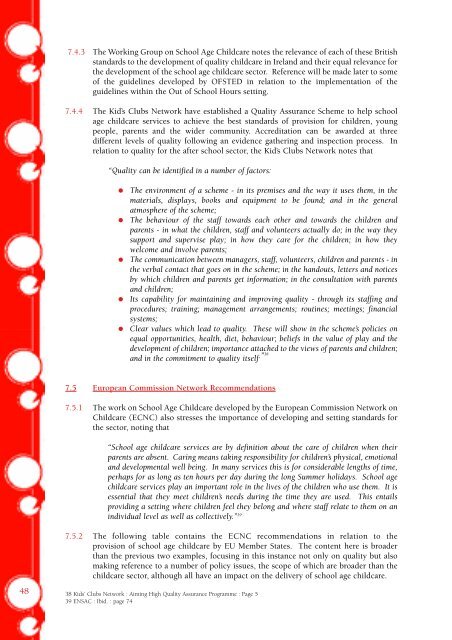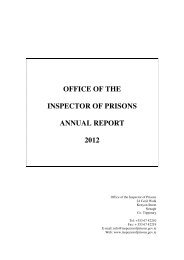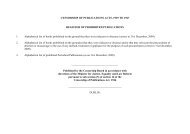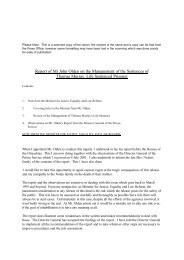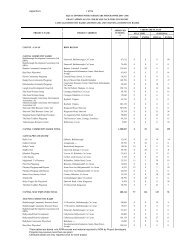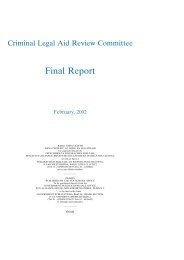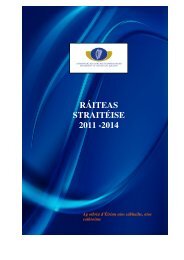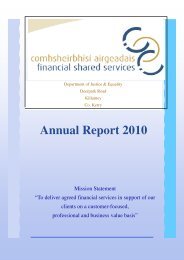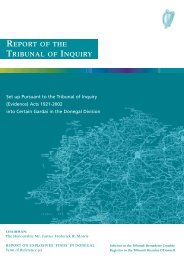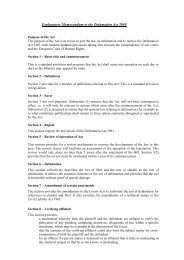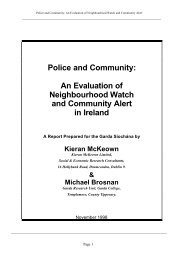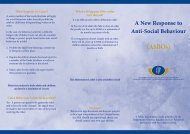Developing School Age Childcare - Department of Children and ...
Developing School Age Childcare - Department of Children and ...
Developing School Age Childcare - Department of Children and ...
You also want an ePaper? Increase the reach of your titles
YUMPU automatically turns print PDFs into web optimized ePapers that Google loves.
7.4.3 The Working Group on <strong>School</strong> <strong>Age</strong> <strong>Childcare</strong> notes the relevance <strong>of</strong> each <strong>of</strong> these Britishst<strong>and</strong>ards to the development <strong>of</strong> quality childcare in Irel<strong>and</strong> <strong>and</strong> their equal relevance forthe development <strong>of</strong> the school age childcare sector. Reference will be made later to some<strong>of</strong> the guidelines developed by OFSTED in relation to the implementation <strong>of</strong> theguidelines within the Out <strong>of</strong> <strong>School</strong> Hours setting.7.4.4 The Kid’s Clubs Network have established a Quality Assurance Scheme to help schoolage childcare services to achieve the best st<strong>and</strong>ards <strong>of</strong> provision for children, youngpeople, parents <strong>and</strong> the wider community. Accreditation can be awarded at threedifferent levels <strong>of</strong> quality following an evidence gathering <strong>and</strong> inspection process. Inrelation to quality for the after school sector, the Kid’s Clubs Network notes that“Quality can be identified in a number <strong>of</strong> factors: The environment <strong>of</strong> a scheme - in its premises <strong>and</strong> the way it uses them, in thematerials, displays, books <strong>and</strong> equipment to be found; <strong>and</strong> in the generalatmosphere <strong>of</strong> the scheme; The behaviour <strong>of</strong> the staff towards each other <strong>and</strong> towards the children <strong>and</strong>parents - in what the children, staff <strong>and</strong> volunteers actually do; in the way theysupport <strong>and</strong> supervise play; in how they care for the children; in how theywelcome <strong>and</strong> involve parents; The communication between managers, staff, volunteers, children <strong>and</strong> parents - inthe verbal contact that goes on in the scheme; in the h<strong>and</strong>outs, letters <strong>and</strong> noticesby which children <strong>and</strong> parents get information; in the consultation with parents<strong>and</strong> children; Its capability for maintaining <strong>and</strong> improving quality - through its staffing <strong>and</strong>procedures; training; management arrangements; routines; meetings; financialsystems; Clear values which lead to quality. These will show in the scheme’s policies onequal opportunities, health, diet, behaviour; beliefs in the value <strong>of</strong> play <strong>and</strong> thedevelopment <strong>of</strong> children; importance attached to the views <strong>of</strong> parents <strong>and</strong> children;<strong>and</strong> in the commitment to quality itself .”387.5 European Commission Network Recommendations7.5.1 The work on <strong>School</strong> <strong>Age</strong> <strong>Childcare</strong> developed by the European Commission Network on<strong>Childcare</strong> (ECNC) also stresses the importance <strong>of</strong> developing <strong>and</strong> setting st<strong>and</strong>ards forthe sector, noting that“<strong>School</strong> age childcare services are by definition about the care <strong>of</strong> children when theirparents are absent. Caring means taking responsibility for children’s physical, emotional<strong>and</strong> developmental well being. In many services this is for considerable lengths <strong>of</strong> time,perhaps for as long as ten hours per day during the long Summer holidays. <strong>School</strong> agechildcare services play an important role in the lives <strong>of</strong> the children who use them. It isessential that they meet children’s needs during the time they are used. This entailsproviding a setting where children feel they belong <strong>and</strong> where staff relate to them on anindividual level as well as collectively.” 397.5.2 The following table contains the ECNC recommendations in relation to theprovision <strong>of</strong> school age childcare by EU Member States. The content here is broaderthan the previous two examples, focusing in this instance not only on quality but alsomaking reference to a number <strong>of</strong> policy issues, the scope <strong>of</strong> which are broader than thechildcare sector, although all have an impact on the delivery <strong>of</strong> school age childcare.48 38 Kids’ Clubs Network : Aiming High Quality Assurance Programme : Page 539 ENSAC : Ibid. : page 74


